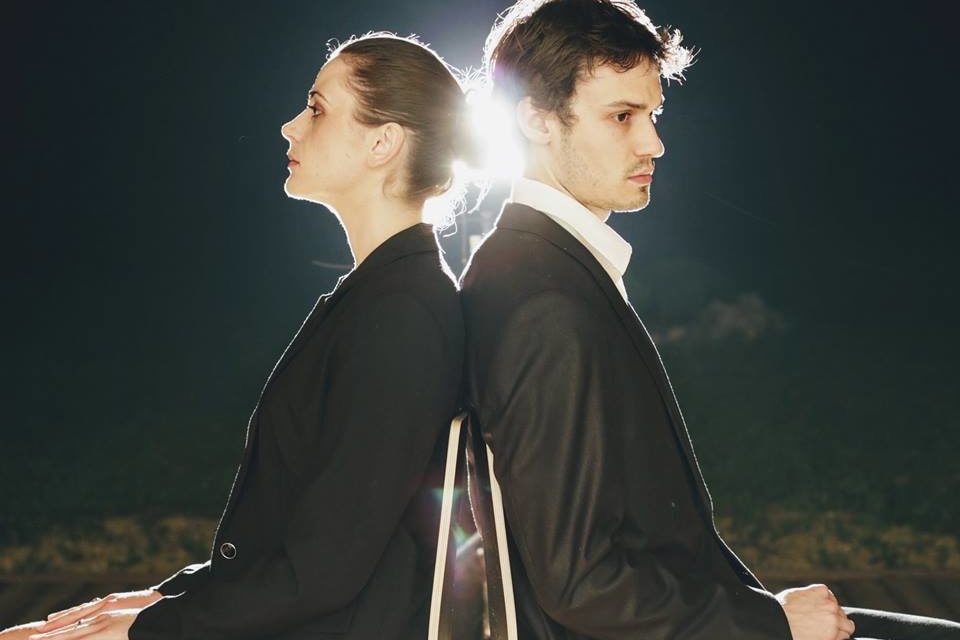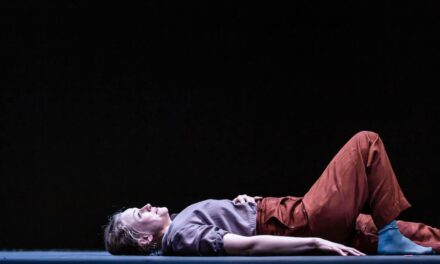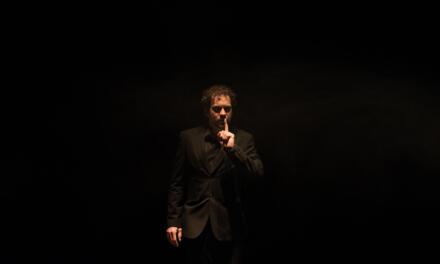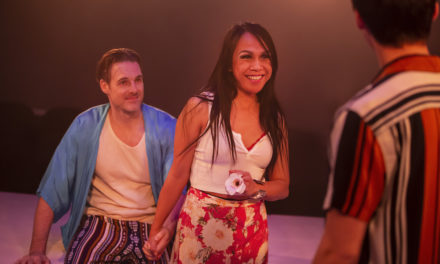25–1919 Paris France is billed as a “performance event”–even a play if you wish, by Elliot Delage. It can only be called a work in progress, far from even seeking some sort of ending (ateleological!) because although the movements are absolutely precise, the structure flounders all over space and time. Barely going beyond brief encounters or fleeting dialogues between two actors who change their emotional interaction, exchange each other’s clothes (no this is not Brechtian at all), flip from actors to those who are pretending to be someone else, or trying to be an existing being.
Or are they portraying characters who appear as various individuals or perhaps ambiguous creatures who appear out of the dark and then disappear? And yet in some curious way it keeps one interested because we can’t help wondering what will pop next out of the obscure corner of this playwright’s imagination.
The beginning is almost seductive! Nothingness! Dark acting space. A male voice calling out “HELLO.” Then a female answers as though she cannot hear and calls out her own questions and as the male voice paints a terrible picture of disturbed parents not knowing how to look after their own children, leaving them with twisted minds as they gave them all manner of false values by not being able to care for little ones before they split up and left the children to fend for themselves. …Perhaps! Because maybe that is not true at all. In fact, there is no truth! But then theatre is not about truth and no one expects the onlooker to come to such a conclusion. The challenge is seeing what you can make of all this!
In a sense what we see is pure theatre! Actors who are pure actors, pure characters who don’t need any preexisting justification to be. They just suddenly come out of the dark. Sometimes the man is passionately happy because he thinks he is going to become a father (there is a motive for you!) The girl, on the other hand, is sullen and frozen-faced. Then suddenly she starts swinging her long mane of hair around, dancing, and feeling good while he looks out at the audience and does not react. They barely look at each other. These are purely theatrical characters who have no psychology, no past life, who are not at all linked to any form of neorealistic scenario that predetermined their psychology and or that set them up for a logical sequence of events. They just ARE! And thus they are not motivated by anything but totally free to react in any way they think or feel. They can even break the codes of theatricality. Suddenly, they walk into the audience, remove all traces of theatrical illusion and start chatting with the spectators about any subject of discussion of the day: Cannabis, migration? So, they ARE hooked on the radio and the TV? That we know. They might want to break the monotony, to create more mystery, but once among the onlookers, their world becomes much more realistic. But that is short lived and it spoils the mystery! How sad.
There is the thread of a pregnancy which runs through the piece and makes the young male very happy. Will he be able to avenge the treatment received from his parents if he becomes a father? Those are the links that we the audience concoct but there is absolutely no proof of that. There is the thread of parents who were killed in a car accident and that the children, especially an unborn child, did not survive or maybe she did. Or perhaps we are back in the past watching the outpouring of that which preceded that horrible accident. But what about those parents? Did they die? Are they all perhaps dead? That would seem to make more sense.
And then as it draws towards the end, the players are again caught in that black nothingness as the male calls out, as before, “hello,” asking who is there, and seeming to be pleased he is not alone.
However, it doesn’t matter at all because we are all clearly trapped in a cycle of existence that will never stop repeating itself as the nightmare unfolds, as the images return, as the characters continue to play themselves or continually change roles and invent new situations. And I felt I didn’t really care and was quite pleased when it was over. Still, there was an overwhelming sense of curiosity that grew as we left the room and waited for the playwright to come out so we could ask him many questions,
This article originally appeared in Capital Critics’ Circle on June 19, 2018, and has been reposted with permission.
This post was written by the author in their personal capacity.The opinions expressed in this article are the author’s own and do not reflect the view of The Theatre Times, their staff or collaborators.
This post was written by Alvina Ruprecht.
The views expressed here belong to the author and do not necessarily reflect our views and opinions.


















